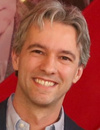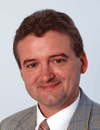
Tuesday, 16 February 201608:00 | Registration, Tea, Coffee and Pastries | 08:45 | Introduction and Welcome from the Flow Chemistry Society
Ferenc Darvas, Chairman, Flow Chemistry Society, Switzerland
| |
Controlling Multisteps | | Session Chair: Andreas Kirschning, Group Leader, Leibniz University of Hannover, Germany |
| | 09:00 | Multistage Continuous Processing for API
Malcolm Berry, Director of Chemistry, Second Generation, Continuous Processing, GlaxoSmithKline, United Kingdom
For this meeting we will detail our approach to developing continuous chemical processes for pharmaceutical ingredients at GSK. We will share some of our successes and challenges, discuss our technology choices and share details of progress with our lead project in manufacturing. | 09:30 | Inductive Heating and Microstructured Flow Reactors – A Good Match
Andreas Kirschning, Group Leader, Leibniz University of Hannover, Germany
This presentation will specifically address the use of heatable materials such as superparamagnetic iron oxide nanoparticles and conductive metals in many areas of organic flow chemistry and how this enabling technology compares to conventional as well as microwave heating. | 10:00 | Coffee & Networking in Exhibition Hall | |
Reactor Design | | Session Chair: Volker Hessel, Professor, Eindhoven University of Technology, Australia |
| | 10:30 | Lab-on-a-chip Devices for Synthesis and Quality Control of Positron Emission Tomography Radiopharmaceuticals
Steve Archibald, Professor, University Of Hull, United Kingdom
Dose-on-demand radiotracer production is the
generation of a single patient dose using a compact synthesis unit at the hospital site. This research presented develops lab-on-a-chip modules for isotope processing, synthesis and routine quality control tests using microfluidic flow devices. | 11:00 |  | Conference Chair Gas-liquid Photochemical Reactions in Flow
Timothy Noël, Professor, University of Amsterdam, Netherlands
In this oral communication, we will report on the acceleration of gas-liquid photocatalytic reactions in continuous photomicroreactors. We will go into detail on both engineering and chemical/catalytic aspects of continuous-flow photochemistry. |
| 11:30 | Supercritical Microfluidics: Investigating and using Supercritical Fluids at Small Scales
Samuel Marre, Researcher, Universite De Bordeaux, France
This talk will highlight the interest of combining continuous supercritical fluids processes with microreactors for various applications including new methods to access thermodynamics data and nanomaterials synthesis in harsh conditions. | 12:00 | Supported (nano)Catalysis within Microreactors
Willem Verboom, Professor, University of Twente, Netherlands
Inner wall-functionalized microreactors, containing a single layer of an organic acid catalyst, catalyst-bearing polymer brushes, or dendrimer-encapsulated nanoparticles, are very effective for appropriate catalyzed reactions. | 12:30 | Lunch & Networking in Exhibition Hall | 13:30 | Poster Viewing Session | |
Process Design | | Session Chair: Timothy Noël, Professor, University of Amsterdam, Netherlands |
| | 14:00 |  | Keynote Presentation Reaction Networks in Flow – "End-to-end” after Activating the “Drop-in”
Volker Hessel, Professor, Eindhoven University of Technology, Australia
So far, flow chemistry was busy with activating “microreactor drop-in” for pharmaceutical synthesis. Nature works with continuous bioassembly lines in its metabolic pathways. The biomimetic analogue here is a chemobio catalyst-based reaction network in flow. With such view on “end-to-end process design”, multi-step flow chemistry (including nanoparticle synthesis) will be presented, revealing the challenges and bottlenecks, thus pointing at future research issues. |
| 14:45 | Engineering of Catalytic Flow Processes
Alexei Lapkin, Professor, University of Cambridge, United Kingdom
The talk will focus on development of supports and new catalysts that can be used as true heterogeneous catalysts in a variety of reactions of broad synthetic utility. Problems of catalyst leaching, reactor blockages, etc, will be addressed and various engineering solutions, including reactor design, discussed. | 15:15 |  Recent Innovations in the Scale up of Flow Chemistry Recent Innovations in the Scale up of Flow Chemistry
Mike Hawes, Chief Executive Officer, Syrris Ltd
| 15:45 | Coffee & Networking in Exhibition Hall | |
Flow Based PAT | | Session Chair: Volker Hessel, Professor, Eindhoven University of Technology, Australia |
| | 16:15 | Investigation of Twin Screw Granulation: Integrating Experimental and Computational Approaches
Thomas De Beer, Professor, Ghent University, Belgium
| 16:45 | Double Trouble - Two multi-component Reactions in Flow
Christopher Smith, Lecturer in Organic Chemistry, University of Reading, United Kingdom
The Petasis and Ugi multi-component reactions were joined in series in an automated flow system. In-line HPLC analysis allowed facile optimisation and kinetic analysis of this six-component reaction. | 17:15 | Enhancing Process Optimization in Flow Chemistry
Mel Koch, Associate Director, CPAC, University of Washington, United States of America
Enhancing Process Optimization in Flow Chemistry by Using Advances in Analytical Tools and the Associated Approaches of Improved Sampling Techniques and Data handling of the Process Parameters. | 17:45 | Continuous Processing in an AstraZeneca Manufacturing World
Anne O'Kearney-McMullan, APS for Continuous Processing, AstraZeneca International, United Kingdom
This talk will discuss the challenges encountered and the approaches applied when introducing continuous manufacturing into AstraZeneca Pharmaceuticals. | 18:15 | Drinks Reception | 19:30 | Close of Day 1 |
Wednesday, 17 February 2016 |
Invention of New Chemical Processes in Flow | | Session Chair: Timothy Noël, Professor, University of Amsterdam, Netherlands |
| | 09:00 | Having Fun with High Energy Nitrogen Compounds in Flow
Bernhard Gutmann, Senior Researcher, Karl Franzens University of Graz, Austria
| 09:30 | Catalysis in Flow
Mimi Hii, Professor, Imperial College London, United Kingdom
The development of atom-economical catalytic flow methodologies for redox transformations for organic synthesis in the liquid phase will be described. This is followed by more recent work on the study of catalyst deactivation and leaching by introducing the continuous flow platform with Operando Spectroscopy and online analysis. | 10:00 | Coffee & Networking in Exhibition Hall | 10:30 | Flowing Safely: Synthesis with Hazardous Chemicals
Thomas Wirth, Professor, Cardiff University, United Kingdom
The presentation will highlight current advances in the safe generation of hazardous compounds in a flow chemistry environment, exemplified
in the synthesis of diazo compounds and radioative pharmaceuticals. | 11:00 | High Throughput Biological Screening Using Micro and Nanofluidics
Joshua Edel, Professor, Imperial College London, United Kingdom
Novel strategies for the detection of single molecules using multiphase microfluidics will be presented. | 11:30 | Evolution of Kinetic Motifs Through Rate-based Experimental Design in Flow Reactors
Christopher Hone, Research Scholar, University of Leeds, United Kingdom
In this paper we present a robust scale-up workflow for the development of flow processes. The approach cycles through evolution of the system’s kinetic motif and the generation of additional experimental data. The scope of the approach is demonstrated on reaction case studies. | 12:00 | Lunch & Networking in Exhibition Hall | 13:30 | Poster Viewing Session | 14:00 | Shading Synthesis Green Using Enabling Technologies
Duncan Browne, Lecturer in Organic Chemistry, Cardiff University, United Kingdom
In this presentation will discuss the development of continuous multistep process for the safe generation of diazonium salts followed by a green reduction by vitamin C to the corresponding hydrazines and subsequent cyclocondensation to afford a range of pyrazole products. | |
Process Control | | Session Chair: Duncan Browne, Lecturer in Organic Chemistry, Cardiff University, United Kingdom |
| | 14:30 | Flow Chemistry at Merck
Rebecca Ruck, Director, Catalysis & Automation, Merck Process Chemistry, MSD, United States of America
This presentation will focus on recent applications of flow chemistry to make possible the advancement of Merck’s development pipeline, with a particular focus on reactions and processes that have experienced significant improvement through the implementation of enabling technologies. | 15:00 | Development of a Flow Tube and Software for Online Reaction Monitoring
Anna Codina, Product Portfolio Manager, Pharma Market, Bruker, United Kingdom
We describe the development of a novel solution, flow tube and dedicated software, for process understanding and optimisation, utilizing NMR. | 15:30 | Coffee & Networking in Exhibition Hall | 16:00 | Flow based Enabling Synthetic Chemistry Technology
Stevan Djuric, Senior Director, Discovery Chemistry and Technology, AbbVie, United States of America
The talk will focus on recent efforts to improve efficiency and scope of operations in our medicinal chemistry organization through the use of flow chemistry platforms. | 16:30 | Continuous Flow Reactions and Automation Techniques
David Fabry, Student, RWTH Aachen University, Germany
In this presentation our efforts to the development of efficient continuous flow procedures and automation techniques will be outlined. | 17:00 | Using Configurable Flow Systems to Discover New Molecules
Lee Cronin, Regius Chair of Chemistry, University of Glasgow, United Kingdom
An approach to understand and explore complex chemical systems using an automated reactor platform to control chemical unit operations according to a well-defined program will be presented. | 17:30 | Close of Day 2 | 18:15 | Wickedness & Witchcraft Walking Tour of Cambridge |
Thursday, 18 February 2016 |
Lab of the Future | | Session Chair: Nicholas Cosford, Professor, Sanford Burnham Prebys MDI, United States of America |
| | 09:30 | | 10:30 | Coffee & Networking in Exhibition Hall | 11:00 | Continuous Flow Reaction Concentrated with Continuous Work-up Steps
Hans-René Bjørsvik, Professor, University of Bergen, Norway
| 11:30 | Synthetic Biology meets Continuous Processing: Towards a Novel Synthesis of Levomilnacipran
Amanda Evans, Assistant Professor, California State University Fullerton, United States of America
The Evans and Arnold groups are applying the use of continuous processing and continuous bioprocessing/engineered enzyme chemistry towards a novel five step synthesis of levomilnacipran, a drug currently prescribed to treat the symptoms of major depressive disorder (MDD). | 12:00 | The Application of Flow Technologies to Chemical Biology Research
Nicholas Cosford, Professor, Sanford Burnham Prebys MDI, United States of America
Examples of solutions to problems in chemistry and biology employing microfluidic and flow procedures will be presented. | 12:30 | Lunch & Networking in Exhibition Hall | 13:30 | The Ley Lab - Lab of the Future - Virtual Workshop
Steven Ley, Professor, University of Cambridge, United Kingdom
Introduction from Professor Steven Ley. Reaction Control and Laboratory Electronics: The Present and Future - Daniel Fitzpatrick
Rationalising and Predicting Organic Reactivity: Automated Computation and Visualisation - Mikhail Kabeshov
Real-time Monitoring Technology: New Insights into in-situ Reaction Navigation - Batool Ahmed Omer Multi-enzymatic Catalysis in Flow - Gina Musio Allene Synthesis using Flow-generated Diazo Compounds - Jian Siang Poh | 16:30 | Close of Conference |
|

 Add to Calendar ▼2016-02-16 00:00:002016-02-18 00:00:00Europe/LondonFlow Chemistry Europe 2016Flow Chemistry Europe 2016 in Cambridge, UKCambridge, UKSELECTBIOenquiries@selectbiosciences.com
Add to Calendar ▼2016-02-16 00:00:002016-02-18 00:00:00Europe/LondonFlow Chemistry Europe 2016Flow Chemistry Europe 2016 in Cambridge, UKCambridge, UKSELECTBIOenquiries@selectbiosciences.com